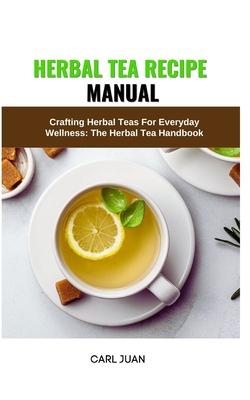
Book
Herbal Tea Recipe Manual: Crafting Herbal Teas For Everyday Wellness: The Herbal Tea Handbook
by Carl Juan
(Write a Review)
Paperback
$8.70
Herbal teas are made from a wide variety of plants and herbs, and their tastes and medicinal properties can vary widely depending on the specific ingredients used. The following ingredients are standard in herbal tea recipes:
1. The recipe will specify which herbs, spices, flowers, or other plant components are called for in the final product of the tea. Chamomile, peppermint, ginger, hibiscus, lavender, and many others are among the common constituents. The taste and possible therapeutic benefits of tea depend on the components used.
2. Preparation: The recipe will tell you what to do with the ingredients and how to do it. This may require washing, cutting, or crushing the herbs, flowers, or other components to unleash their tastes and active ingredients.
3. When it comes to brewing, the recipe will detail the ideal water temperature, steeping time, and technique. For instance, certain herbal teas are best brewed with boiling water, while others may require colder temperatures to avoid harshness or loss of delicate flavors. Depending on the components, the recommended steeping time can range from a few minutes to many hours.
4. Flavorings & Additives: To further enhance the flavor of herbal tea, some recipes may propose adding honey, lemon, or spices. Each person has the option of customizing these enhancements to their liking.
5. Herbal teas are popular not only for their delicious taste, but also for the health benefits they may provide. It's possible that the recipe will tout its ability to help you unwind, ease your stomach, and replenish your antioxidant stores.
6. Whether the tea should be strained before serving or if there are any typical garnishes or accompaniments, this information will usually be included in the recipe.
The goal of many herbal tea recipes is to make a calming beverage, but there is also interest in extracting medicinal benefits from the herbs and plants used in the preparation. They're a great opportunity to sample new plants and learn about their medicinal and culinary uses.
Herbal teas are made from a wide variety of plants and herbs, and their tastes and medicinal properties can vary widely depending on the specific ingredients used. The following ingredients are standard in herbal tea recipes:
1. The recipe will specify which herbs, spices, flowers, or other plant components are called for in the final product of the tea. Chamomile, peppermint, ginger, hibiscus, lavender, and many others are among the common constituents. The taste and possible therapeutic benefits of tea depend on the components used.
2. Preparation: The recipe will tell you what to do with the ingredients and how to do it. This may require washing, cutting, or crushing the herbs, flowers, or other components to unleash their tastes and active ingredients.
3. When it comes to brewing, the recipe will detail the ideal water temperature, steeping time, and technique. For instance, certain herbal teas are best brewed with boiling water, while others may require colder temperatures to avoid harshness or loss of delicate flavors. Depending on the components, the recommended steeping time can range from a few minutes to many hours.
4. Flavorings & Additives: To further enhance the flavor of herbal tea, some recipes may propose adding honey, lemon, or spices. Each person has the option of customizing these enhancements to their liking.
5. Herbal teas are popular not only for their delicious taste, but also for the health benefits they may provide. It's possible that the recipe will tout its ability to help you unwind, ease your stomach, and replenish your antioxidant stores.
6. Whether the tea should be strained before serving or if there are any typical garnishes or accompaniments, this information will usually be included in the recipe.
The goal of many herbal tea recipes is to make a calming beverage, but there is also interest in extracting medicinal benefits from the herbs and plants used in the preparation. They're a great opportunity to sample new plants and learn about their medicinal and culinary uses.
Paperback
$8.70